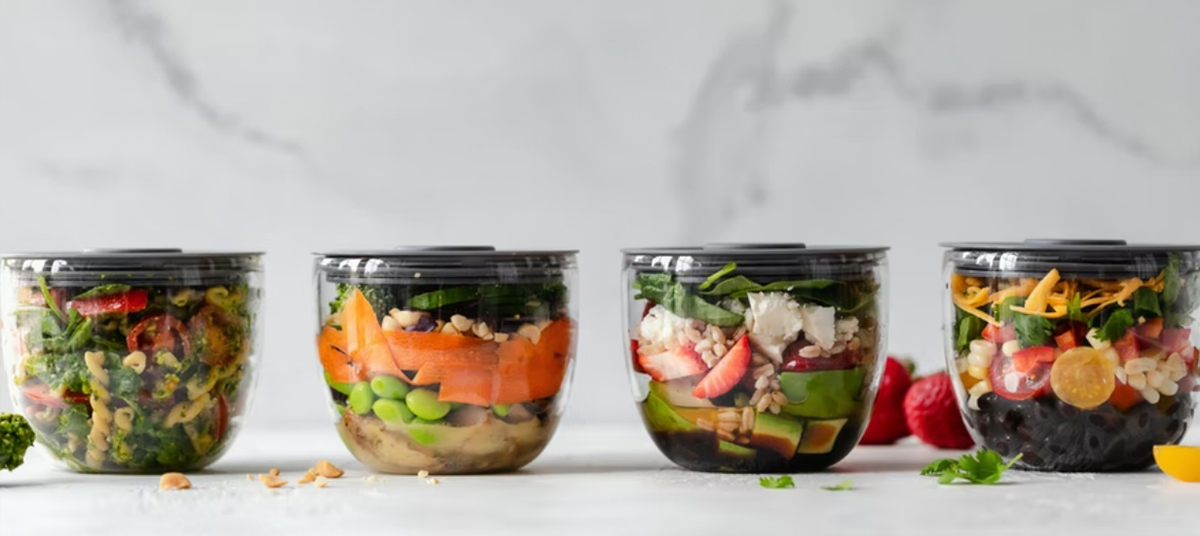August 29, 2022
UK food awareness organizations, vegan charities, and plant-based food companies have united to initiate a school food revolution to transform school meals for the better.


Photo by S'well on Unsplash
In 2022, children are more climate aware than ever before, to the extent that nine in 10 children are concerned about climate change, and nearly six in 10 young people aged 16-25 are either "very" or "extremely worried" about our planet. Transforming this anxiety into action, young people are now the driving force pushing for change, and according to one study, are the demographic inspiring older generations to take action.
Diet change has now been identified as one of the most effective strategies to combat the crisis, with the industrial food system being labeled as a "major culprit" of global heating. That said, people are taking note, and gradually more and more are adopting plant-based diets. This is especially true for younger generations, who are reportedly more likely to go plant-based to save the planet. Revealing just how much the landscape is changing, a survey by BBC Good Food interviewed 1,000 children in the UK aged 5-16 and found that 8% of children currently follow a vegan diet, and an additional 15% would like to explore plant-based eating.
Interestingly, YouGov research discovered that while 29% of 11-18-year-old meat-eaters want to reduce their meat intake, they're unsure of how to do so. The Vegan Society says one of the barriers to switching to plant-based food is not having these options in school canteens. This is despite research from Linda McCartney Foods finding that 70% of British children want more 'meat-free' meals on their school menus. The Vegan Society, ProVeg UK, Meatless Farm, and Plant Based School Kitchens, are just some of the organizations, charities and plant-based companies that are working to change this.
Switching to more plant-based diets will play a crucial role in achieving our climate targets and transitioning away from an overreliance on animal protein. Pulses, specifically, will be a key part of our transition to a more sustainable food system, and according to a study published in the National Library of Medicine, eating pulses instead of meat even just twice a week increases diet sustainability.
Shifting to more plant-based diets isn't just climate-friendly either, it’s healthier and can help children increase their fiber and vegetable intake, which is a recommendation made by the National Food Strategy. This is especially significant considering that most children in the UK are fiber-deficient, and one-third aged 5-10 fail to eat more than one portion of vegetables a day. Research from UCL also has found that children who eat vegan diets have a "healthier cardiovascular profile and less body fat" than their omnivore peers.
Plant-based diets can be more financially viable for families, too, with research by Oxford University revealing that in the UK, Australia, US and Western Europe, adopting a "vegan, vegetarian, or flexitarian diet" can cut food bills by one-third.
In its recent report, 'Vegan Food For Children,' The Vegan Society identified that schools play a "crucial role" in establishing healthy eating habits for children from a young age. It also highlighted that schools are positioned to "normalize an ethical food culture," which, instead of relying on animals, embraces "tasty protein-packed and fibre-rich vegan staples” such as lentils, chickpeas and beans.
The vegan charity surveyed 500 parents and guardians with children aged 15 or younger, and found significant support for bringing more plant-based food into schools. When asked about the current vegan options offered to children in schools, 65.1% strongly agreed that there could be more on offer, and 66.9% agreed that they would like to see more healthy vegan options for students. It was also found that nearly half of those surveyed (48.3%) said that they would support more "vegan meals focused on wholefoods," including spaghetti bolognese made from lentils. Likewise, there was similar support for schools offering more meat alternatives (45.7%). Also included in the report was research conducted by YouGov in 2020, which found that nearly 70% of parents (67%) would support their child going vegan.
The Vegan Society is now supporting a petition launched by vegan dad Aaron Browning to require nutritionally balanced hot vegan meal options on every school menu. When the petition reaches 100,000 signatures, it will be considered for a parliamentary debate. Currently, there are 25,853 signatories, including Animal Justice Project, SURGE, Viva!, Plant Based Treaty, and ProVeg International.
Speaking to the GPC, The Vegan Society's Education Chair, Laura Chepner, commented: "Advocating for children regarding plant-based options in schools is the least that we can do - after all, it is their planet and health that is being compromised daily. The petition that our Education Network is supporting not only highlights the discrimination that families experience when they are refused plant-based options it also asks the government to act on the fact that there is an ever-growing demand for climate-friendly, delicious, and healthy plant-based dishes."
ProVeg UK, a food awareness organization, has taken the lead on bringing more plant-based food into UK schools. In 2018, it launched its School Plates program to bring healthier, cost-effective, and low-carbon food onto school menus.
The initiative is now working with over 43 catering partners, including schools, local authorities and academy trusts to help them redesign and develop their school menus and assess their menu positioning and language. The charity also conducts training workshops through which it offers presentations and cooking demos and provides partners with a School Plates guide and recipe book to familiarize the cooking team with plant-based cooking products.
In a discussion with the GPC about the role pulses have to play in transforming school menus, Kirsty Leese, Campaigns and Communications Manager, said that ProVeg is focusing on incorporating whole foods into school menus because of the nutritional profile they deliver. Whether creating savory or sweet dishes, pulses feature significantly on the school menus. Leese outlined that more novel uses of pulses have been well-received and mentioned that black bean brownies had been a hit among students.
While the program seeks to ensure that vegan and vegetarian children are provided with nutritious hot meals, Leese explained that ProVeg is also targeting flexitarians students who are interested in trying plant-based food, and cutting their emissions.
To recognize the work being done by schools to transform menus, ProVeg UK launched the Green School Menu League (GSML) in collaboration with plant-based meat company Meatless Farm and Omari McQueen, the UK's youngest TV chef. The initiative was set up as a reward scheme to highlight schools that scored highly on menu positioning, language use, and the number of plant-based days they have each week. Waltham Forest was crowned the winner of the GSML and received £2500 for their school's sustainable eating program and a cooking demonstration from McQueen.
Worthing-based catering company, Plant Based School Kitchens is another company driving forward diet change in UK schools. Launched by husband and wife duo Gary and Anna Hardley, the company is an offshoot of their vegan cafe The Vegan Street Food Co., and is now operating the UK's first plant-based school kitchen. Gary Hardley has been a chef for 35 years, and both he and his wife were introduced to plant-based food after Anna was diagnosed with a number of food allergies. Following the success of their gluten and nut-free vegan local cafe, local school Our Lady of Sion reached out to the company to cater for the school, and they haven't looked back since. Now, the couple is planning a UK roll-out of vegan school lunches. "It's ever-growing, and we're leading the way," said Gary. The company worked with nutritionists and health professionals to create the school menus, which focus on incorporating whole foods and delivering on flavor.
"We're not just cooking, we're changing people's lives and it makes a difference," said Gary Hardley, adding that the company loves using pulses within their dishes because of their versatility and said that they go in everything from their chili con carne to their curries.
Although there are significant strides being made to bring more plant-based food into schools, across the board, those working in the space have noted their disappointment with the government's National Food Strategy, emphasizing that much more needs to be done.
Discussing ProVeg's stance on the strategy, Leese said that the charity was "extremely disappointed" and that there was a "shocking omission" of the importance of consuming plant-based food for the planet. She outlined that the strategy suggestion made by Henry Dimbleby was an "actual strategy," and one which ProVeg supported, including recommendations such as a 30% reduction in meat consumption, 20% more fruit and vegetables, and 50% more fiber.
Vegan chef Gary Hardley expressed similar sentiments, and when asked about what needs to be done to increase the consumption of plant-based foods across the UK, he said: "It's a government thing." He went on to explain that there needs to be a transformation similar to what was achieved by Jamie Oliver, following his 'Feed Me Better' campaign, which saw tough new legal standards for meals in England's schools.
It is clear that while some positive steps are being taken, the change is primarily being driven by a small minority, largely in the nonprofit sector. Through the success of plant-based initiatives, petitions, and competitions, it has become clear just how many children and their parents are ready to make the switch. The next step is to advance the movement to a governmental level to ensure both a sustainable increase in plant-based eating and a reduction of carbon emissions.
Disclaimer: The opinions or views expressed in this publication are those of the authors or quoted persons. They do not purport to reflect the opinions or views of the Global Pulse Confederation or its members.